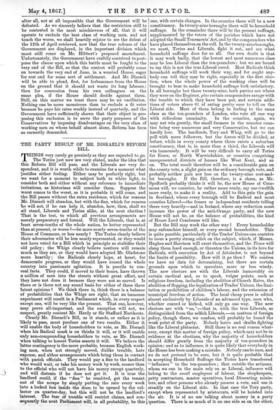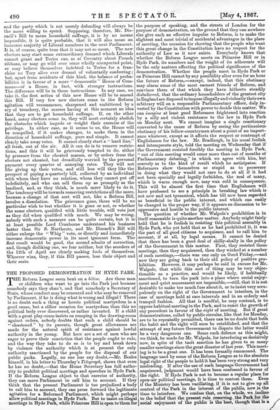THE PARTY RESULT OF MR. DISRAELI'S REFORM BILL. T HINGS very
rarely go precisely as they are expected to go. The Tories just now are very elated, under the idea that this Reform Bill will pass, and the Liberals are very de- spondent, and it is worth while to examine for a moment what justifies either feeling. Either may be perfectly right, but we want for a moment to subject both to white light, to consider both and either without any reference to immediate irritations, as historians will consider them. Suppose the worst comes to the worst, as it is probable it will come, and -the Bill passes without the extra residence, which for reasons Mr. Disraeli will abandon, but with the fine, which for reasons he will not, if he can help it, abandon, how, then, shall we all stand, Liberals and Tories alike, at the next election I 'That is the test, to which all previous arrangements are merely preparatory and formal. Will the Liberals, that is, at Yeast seven-tenths of the whole nation, be better represented than at present, or worse ?—be more nearly seven-tenths of the House of Commons, or less nearly ? The Tories clearly believe their adversaries will be less nearly represented, or they would not have voted for a Bill which in principle so stultifies their old policy ; the Whigs clearly believe matters will remain much as they are, or they would have adopted Mr. Gladstone more heartily ; the Radicals clearly hope, at heart, for democratic progress, or they would have roused the whole -country into passionate agitation. It is puerile to con- ceal facts. They could, if moved to their bones, have thrown a million of men into the streets without great effort, and 'they have not done it because they were not so moved. Is -there or is there not any sound basis for either of these three latent opinions ? We think there is, think there is a balance of probabilities that the Whigs are right, that an immense experiment will result in a Parliament which, in every respect except one, will be very like the present. That one, however, may prove all-important, and the exception will not, we suspect, greatly content Mr. Hardy or Sir Stafford Northcote.
Clearly Mr. Disraeli's Bill, as it stands, or rather as it is 'likely to pass, must produce one of two results. Either it -will enable the body of householders to vote, as Mr. Disraeli -when his Radical mask is on thinks it will, or it will enable only non-compounding householders to vote, as Mr. Disraeli when talking to honest Tories asserts it will. We believe the latter contingency is the more probable, because English work- ing men, when not strongly moved, dislike trouble, hate expense, and abhor arrangements which bring them in contact -with parish officials. They would pay a fine to the landlord who would wait, or take his money week by week, sooner than to the official who will not have his money except quarterly, and will distrain if he does not get it. It is tree the landlord could, if the "fine " be remitted, get the tenant cut of the scrape by simply putting the rate every week into a locked box inside the door, to be opened by the col- lector on quarter-day, but this will not be the landlord's interest. The fear of trouble will restrict claims, and con- sequently the next Parliament will, in all probability, be this one, with certain changes. In the counties there will be a new constituency. In twenty-nine boroughs there will be household suffrage. In the remainder there will be the present suffrage, supplemented by the voters of the parishes which have not adopted the Small Tenements' Act, and by the compounders who have placed themselves on the roll. In the twenty-nineboroughs, we must, Tories and Liberals, fight it out, and see what household suffrage does for us all. Our own doubt is that it may work badly, that the lowest and most numerous class may be less Liberal than the ten-pounders ; but we are bound to say this is not the true Liberal creed. Most Radicals think household suffrage will work their way, and for aught any- body can tell they may be right, especially in the first elec- tion, when the whole power of the working class will be brought to bear to make household suffrage look satisfactory. In all boroughs but these twenty-nine, both parties are where they were on the Register, plus certain compounders savage with the trouble to which they have been put, and certain addi- tions of voters above 61. of rating pretty sure to tell on the Liberal side. Most of them belong in feeling to the same class as the ten-pounders of London, who vote all one way with ridiculous unanimity. In the counties, again, we may not win greatly, the small farmers in the remoter coun- ties being very numerous and very Conservative, but we can hardly lose. The landlords, Tory and Whig, will go to the poll with more followers, but the forces will be divided, as before, while in every county where there exists a suburban constituency, that is, in more than a third, the Liberals will win immensely. It will be very difficult to carry all Tories for Essex, or North Warwickshire, or counties comprising unrepresented districts of houses like West Kent, and so on. The total result therefore will be a considerable gain on the county vote, a slight gain on the ordinary borough vote, and probably neither gain nor loss on the twenty-nine scot-and- lot boroughs. If the Bill, therefore, is a sham, as Mr. Spofforth probably thinks it will be, the new House of Com- mons will, we conceive, be rather more ready, say one-twelfth more ready, to make it a reality. Add to this gain the gain in Scotland, where every borough will be Radical and most counties Liberal—the feuars or independent residents telling there very heavily—and in Ireland, where any reduction must increase the power of the anti-Orange party, and the new House will not be, on the balance of probabilities, the kind of House Lord Cranborne will like.
But the Bill may work the other way ? Every householder may enfranchise himself, or every second householder. This is quite possible, particularly if the Trades' Unions can contrive to issue a pretty strong edict on the subject, which, if Messrs. Hughes and Harrison will exert themselves, and the Times will slang them hard enough, or threaten the Unions, in its love for Radicals, with execution by Act of Attainder, is not beyond the limits of possibility. How will it go then ? We confess we have no data for determining, but there are certain grounds upon which to speculate, more or less wisely. The new electors are with the Liberals immovably on certain cardinal and, so to speak, vulgar points, such as religious freedom, including the abolition of Church Rates, the abolition of flogging, the legalization of Trades' Unions, the limi- tation or prohibition of children's labour, and the extension of municipal freedom of action. The local cheap press is edited almost exclusively by Liberals of an advanced type, men who, whether coaxed or kicked, will only go one way. The new electors are with "us,"—that is, with the true Liberals, as distinguished from the selfish Liberals,—on matters of foreign policy, though there, we confess, will probably be found the weak point of the party. Nobody hates and skulks fighting like the Liberal plutocrat. Still there is no real reason what- ever, except this matter of foreign policy, which may not be in evidence at the elections, why the majority of householders should differ greatly from the majority of ten-pounders in opinion; and as to influence, it is quite likely that everybody in the House has been making a mistake. Nobody can be sure, and we do not pretend to be sure, but it is quite probable that in accepting Household Suffrage the Tories have transferred " influence " to the ten-pounders ; that outside the artizans, whom we can in the main rely on as Liberal, influence will belong to the small employers of labour, the shopkeepers, petty contractors, master operatives, local Dissenting minis- ters, and other persons who already possess a vote, and use it steadily on the Liberal side. In that case the Tory party, except when represented by aristocrats, will be hoisted into the air. It is of no use talking about money in a party question. There is as mach of it on one side as on the other, and the party which is not merely defending will always be the more willing to spend. Supposing, therefore, Mr. Dis- raeli's Bill to mean household suffrage, it is by no means impossible, it is quite probable, that it will also mean an immense majority of Liberal members in the next Parliament. It is, of course, quite true that it may not so mean. The new electors may start some extraordinary demand which Liberals cannot grant and Tories can, as at Coventry about French ribbons, or may go wild over some wholly unexpected point, or may believe themselves indebted to Tories for a fran- chise no Tory alive ever dreamt of voluntarily conferring ; but, apart from accidents of this kind, the balance of proba- bilities is in favour of a more " democratic " House of Com- mons—of a House, in fact, with stronger instructions. The difference will be in those instructions. In any case, we take it, the first action of this new House will be to amend this Bill. If very few new electors come in the Reform agitation will recommence, sharpened and embittered by a cry of treachery, the masses having at this moment an idea that they are to get household suffrage. If, on the other hand, many electors come in, they will most certainly abolish the obstacles which impede or weight their exercise of the privilege. In either case, as it seems to us, the House will be compelled, if it makes changes, to make them in the direction of household suffrage, pure and simple. It cannot clearly take away votes. It cannot clearly start a " hard line," all fresh, out of the air. All it can do is to remove restric- tions, and this it will be grievously tempted to do, either by pressure from the cheated masses, or by orders from the electors not cheated, but dreadfully worried by the personal payment every quarter of annoying rates. They will not like giving up their votes, and still less will they like the prospect of paying a quarterly bill, collected by an individual with whom they have no relation, whom they cannot put off indefinitely, and who can sell them up as promptly as the landlord, and, as they think, is much more likely to do it. The tendency will be towards removing restrictions all the more, because a change of that sort will not, like a Reform Bill, involve a dissolution. The grievance gone, there will be no particular wish to test whether it is gone or not, or whether the same electors, qualified with little trouble, will vote just as they did when qualified with much. We may be wrong, nobody with such a measure can be quite certain, but it is at least possible Lord Cranborne understood his business better than Sir S. Northcote, and Mr. Disraeli's Bill will either enlarge the " Whig " vote, or directly and immediately increase democratic power in its most ignorant form. The first result would be good, the second admits of correction, and, though disliking one, we fear neither, but the seceders of the 12th of April are clearly making fools of themselves. Whoever wins, they, if this Bill passes, lose their object and their seats.































 Previous page
Previous page